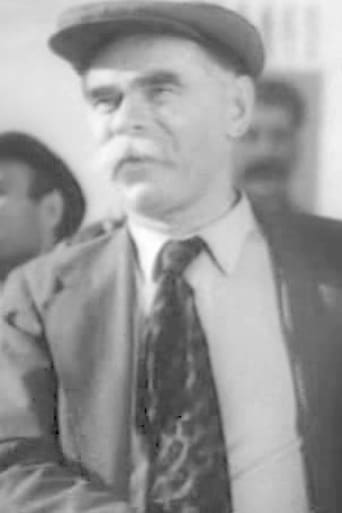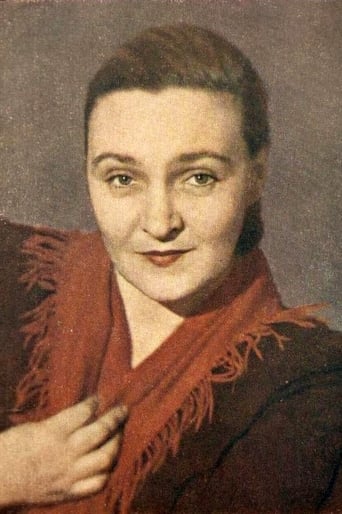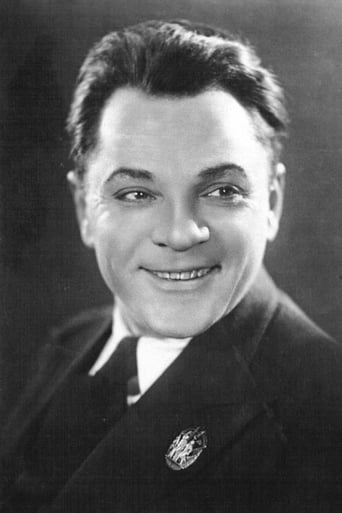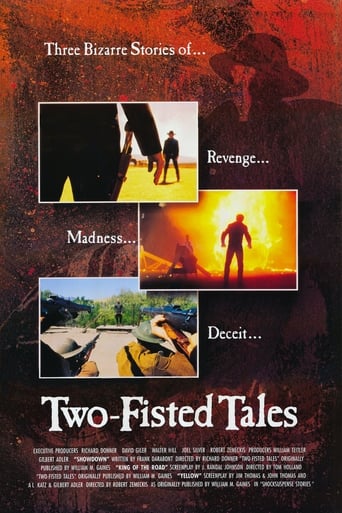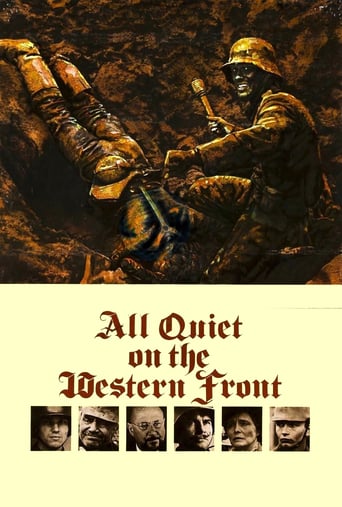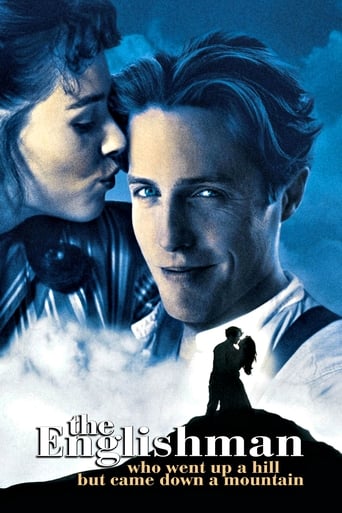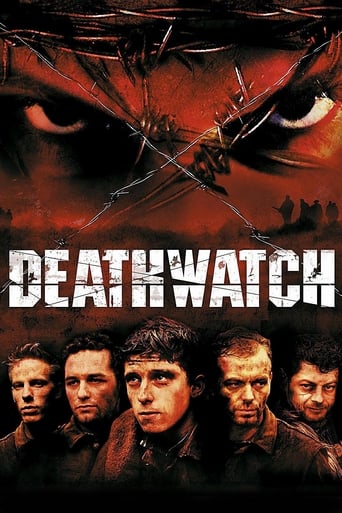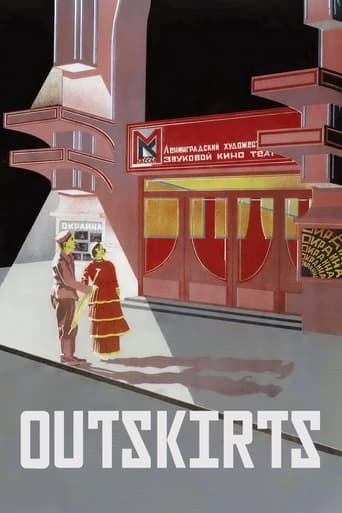
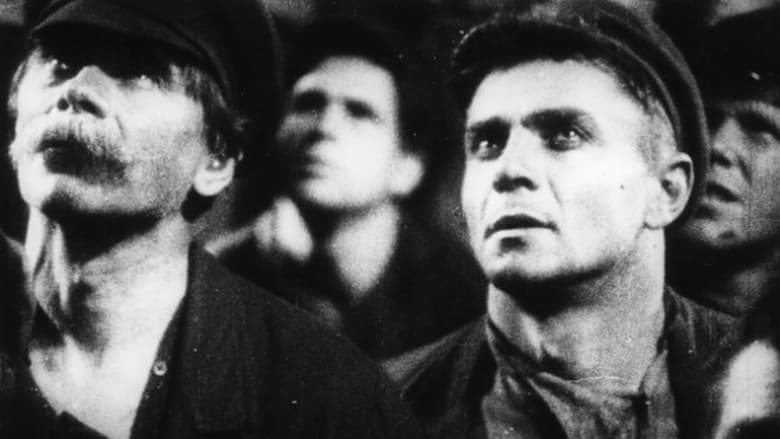
Outskirts (1933)
Outskirts is an internationally renowned masterpiece of early sound cinema. In a remote Russian village during World War I, colorful and nuanced characters experience divided loyalties: family loyalty vs. personal desire, nationalism vs. transcendent humanism.
Watch Trailer
Cast
Similar titles
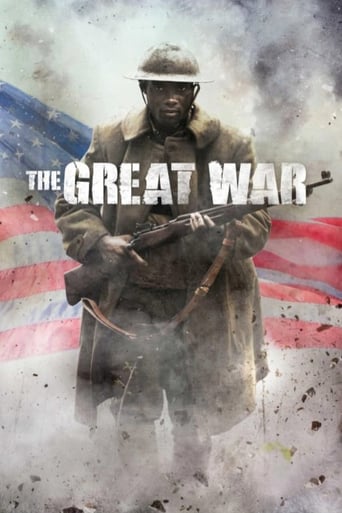


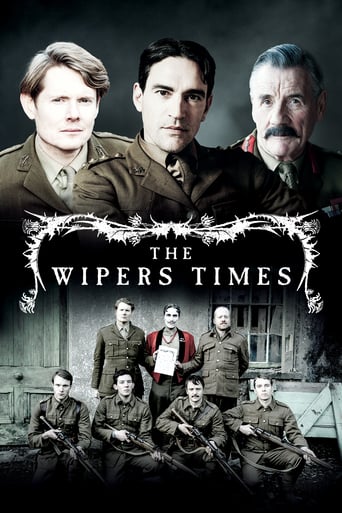
Reviews
People are voting emotionally.
At first rather annoying in its heavy emphasis on reenactments, this movie ultimately proves fascinating, simply because the complicated, highly dramatic tale it tells still almost defies belief.
Exactly the movie you think it is, but not the movie you want it to be.
An old-fashioned movie made with new-fashioned finesse.
This was an interesting movie to watch due to the format of the film itself. Although the film summary talked about a love story between Anka and a German prisoner of war there was no mention of the rest of the cast who the story also centered on. It was less of a love story and more of a story about a small village and the people living there. Throughout the whole movie there is a struggle between the workers and the owners of the shoe factory in the town, which reflects the national struggle at the time between the tsarist regime and the Bolshevik movement. Honestly, this movie was slightly confusing. Yes, it was very good at touching on a number of themes – how ideas can transcend national identities, workers united, and the greed of industry – but it went about it in a very confusing manner by jumping between different stories. It also seemed like the last 20 minutes of the film were rushed with the time skip and then trying to resolve the stories in a timely manner. Outskirts criticized the pre-revolutionary government with its portrayal of the shoe factory owner. The factory owner is portrayed as a greedy industrialist who only sees the war as a way to make profit and does not care for his fellow workers. However, this isn't made apparent until those last 20 minutes of the film. While the film is entertaining and contains typical party ideals it falls short in its presentation by trying to do too much at once.
It's difficult for me to judge Rivette's statement about Boris Barnet having been the greatest of Soviet filmmakers after Eisenstein ; I definitely prefer his works to Eisenstein's or let's say Pudovkin's.Even in our postmodern days, Barnet's hybrid of social realism, satire, romance, genre movie, musical and slapstick may be called eccentric. Rich, dynamic mise en scene is quintessential of this masterpiece condemnation of militarism, nationalism (and capitalism). It consists of two distinct parts, the first, pre-war one mixing realism with bizarre humour, the second delivering images of war rare in their docu-like naturalism far from Eisensteinian pathos.The transfer on Mr. Bongo's recent release seems quite good ; regrettably no extras were taken from the original Ruscico version./To any reader of this interested in Barnet I would like to recommend another gem by this filmmaker - funny, charming and moving "Dom na Trubnoy" ("The House on Trubnaya Street"). It was recently released in France, with Russian intertitles and French subs (the movie is a silent one)./
The remarkable qualities of this early sound film pertain to it's stunning use of sound which is inventive and innovative by any and all standards, the stunning camera movements and long takes. Just as remarkable is the storytelling which plays like a series of short stories and sketches rather than a novella or novel. Yet it doesn't break these short stories into segments or blocks or frame it unlike other attempts at multiple short narratives in a feature.The movement between the various segments and stories is very poetic like from one Greek chorus to another. The central conceit being between the conflict between the war frontlines and the homefront of the village. The scenes of warfare shown in this film is harsh and brutal in a way that anticipates Roberto Rossellini's or Samuel Fuller's later films.What makes it even more harsh is the sense of futility in the conflict. As the infantrymen who fight each other in the trenches have more in common than either would do with their civilian countryman, anticipating Renoir's La Grande Illusion. One breathtaking scene is when one Russian soldier saves a German from getting bombed and then tells him after their initial celebration that he'll be their prisoner now.Equally moving is the tender love story between a Russian girl Anka and a German POW given permission to work in the village. This love story is made possible because Anka's father's friend Robert Karlovish, a German taught her enough about his country to escape the xenophobia of that community at war. Also interesting is the sense of homoeroticism, neither vulgar nor campy, among the various male characters. Early in the film when the soldiers leave for the front there is a wonderful shot of two men kissing each other on the lips which is shown casually without any sense of sensation in the presentation of this scene. Barnet in his film shows that despite the conflict, the violence, the sense of division among his characters(all acted superbly conveying a naturalism absent in many early talkies) there is always a brief glimpse of what things could be or should be.Even if for reasons of propaganda the film ends with the parade of saviour communists, Barnet has managed to create a film that transcends that all the more by ending the film in a shot worthy of Dovzhenko(a key influence on this film) where a character after hearing the arrival of the commmunists, breathes close to death, "What a rush!" and presumably dies off-screen. The world of this film belongs to people, to human relations and not to party lines.
I first heard of Boris Barnet at the Telluride Film Festival in the mid-80s-- a rather dour intro by the historian Ian Christie was odd prepararation for two absolutely delightful silent comedies, The Girl With a Hatbox (starring Anna Sten, whom Sam Goldwyn would fail to make into the next Garbo) and The House on Trubnaya Street. Outskirts is Barnet's first sound film, and a darker work, though not as it is often described, purely a serious one.The setting is the year 1914, first in a total backwater (we never know exactly where this town is, or if it's attached to something bigger, it's one town out of a thousand in Tsarist Russia) and then, as war breaks out, at the front as well. The plot is simply a series of episodes, initially comic though increasingly grim, depicting the ordinary folk. Though war is here and the great Soviet revolution is coming, the movie seems to offer little more than a sardonic Russian shrug toward such events, the people much more interested in love and clowning around. Like some other early Soviet talkies, Barnet makes a virtue of primitive Soviet sound technique by using sound expressionistically; the difference between this and a film like Pudovkin's Deserter is that Barnet often uses sound to blow a raspberry at whatever grandiose thing is supposed to be happening.This vaguely avant-garde aspect has led a few critics like Jonathan Rosenbaum to call Outskirts an unknown masterpiece of cinema, but it's a little too rough and awkwardly put together for the name to fit comfortably. And more to the point, a Soviet masterpiece is something grand and auspicious, and this is a very different kind of film, closer in spirit to some of Godard's playful and absurdist early films, or to the casual working stiff's cynicism of 1960s Eastern European films like Menzel's Larks on a String, which mocked the pretensions and promises of Soviet society but were careful not to get too specific lest the censor's hand come crashing down. (Actually in both cases the hand came down anyway; Larks on a String was shelved for 20 years, and Barnet apparently got in trouble for Okraina, though by mid-30s Soviet standards he got off lightly and at least continued to work for another 25 years before committing suicide in the Brezhnev era.)
